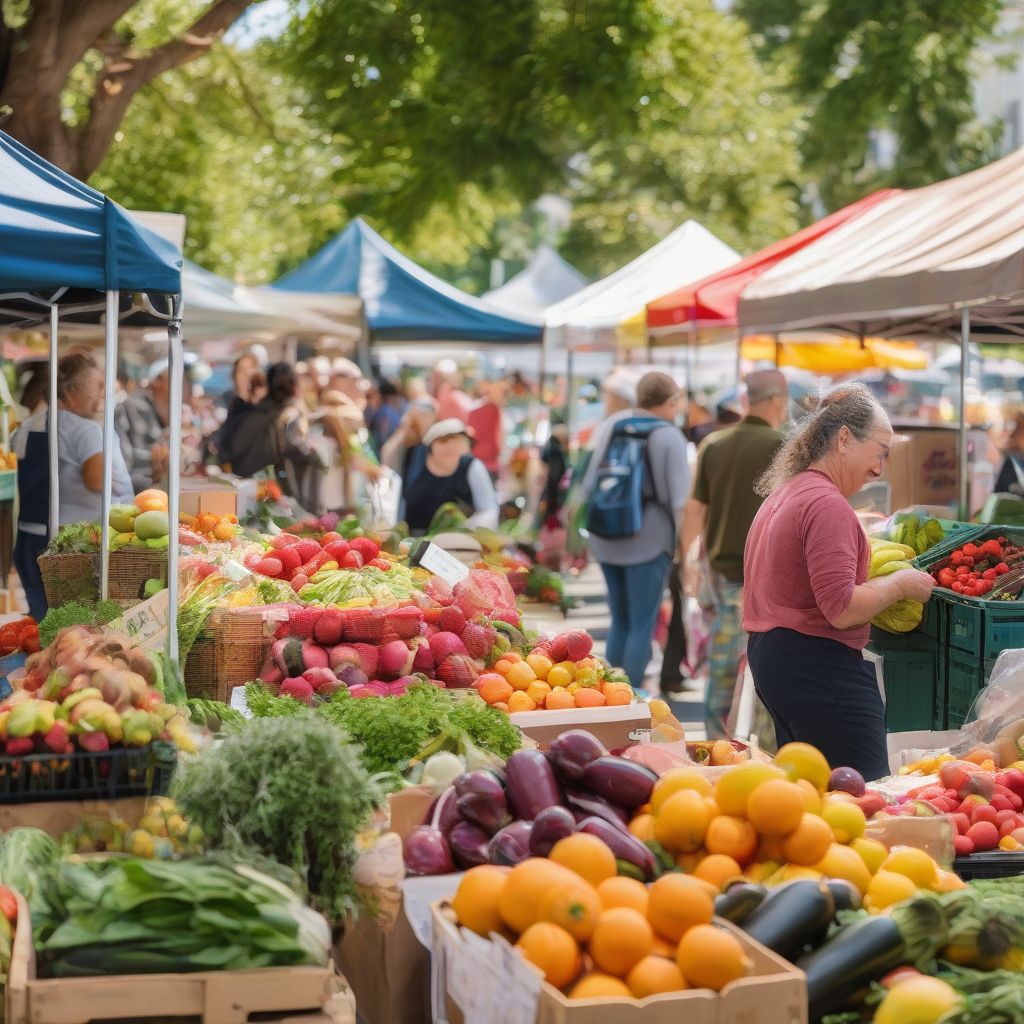Imagine biting into a juicy strawberry, its vibrant red color a testament to its ripeness. It’s bursting with flavor, a sweetness that dances on your tongue. Now, imagine that same strawberry, grown without harmful pesticides, its cultivation a mindful dance with nature, enriching the soil and supporting biodiversity. This is the essence of choosing organic and sustainably-sourced food – a choice that prioritizes both personal health and the well-being of our planet.
Understanding the “Why” Behind Organic and Sustainable Food Choices
In a world grappling with the consequences of industrial agriculture, opting for organic and sustainably-sourced food is no longer a fringe movement but a conscious step towards a healthier future. But what exactly do these terms mean, and why should they matter to you?
Organic: What it Means and Why it Matters
Organic food production is guided by a set of rigorous standards that prioritize ecological balance, biodiversity, and the avoidance of synthetic inputs. Here’s a closer look:
-
No Synthetic Pesticides and Herbicides: Organic farming says “no” to toxic chemicals that contaminate our food and environment. Instead, they rely on natural pest control methods, crop rotation, and composting to maintain healthy ecosystems.
-
Genetically Modified Organisms (GMOs) are a No-Go: Organic farming steers clear of genetically modified seeds and organisms, preserving natural biodiversity and reducing the risk of unforeseen ecological consequences.
-
Soil Health is Paramount: Organic practices focus on nurturing the soil, the foundation of our food system. Composting, cover cropping, and crop rotation enhance soil fertility, prevent erosion, and promote water retention.
Sustainable Sourcing: Beyond Organic to a Holistic Approach
Sustainability in food goes beyond the “organic” label to encompass a broader set of values that consider the environmental, social, and economic impacts of food production and consumption. This includes:
-
Supporting Local Farmers and Economies: Buying from local farmers strengthens your community, reduces food miles and carbon emissions associated with transportation, and often brings fresher, tastier food to your table.
-
Fair Trade Practices: Choosing Fair Trade certified products ensures that farmers and workers in developing countries receive fair wages and work in safe and ethical conditions.
-
Reducing Food Waste: Embracing sustainable practices means minimizing food waste throughout the supply chain, from farm to table.
 Fresh Produce at a Farmer's Market
Fresh Produce at a Farmer's Market
The Benefits of Choosing Organic and Sustainably-Sourced Food
Opting for organic and sustainably-sourced food is an investment in your health, the environment, and a more just and equitable food system. Let’s explore the compelling reasons to make this conscious shift:
Protecting Your Health and Well-being
-
Reduced Pesticide Exposure: Studies have linked pesticide exposure to a range of health issues, including hormone disruption, reproductive problems, and certain types of cancers. Organic food significantly reduces your exposure to these harmful chemicals.
-
Higher Levels of Nutrients: Research suggests that organic fruits and vegetables may contain higher levels of essential vitamins, minerals, and antioxidants compared to their conventionally grown counterparts.
-
Avoiding Antibiotic Resistance: The overuse of antibiotics in conventional livestock farming contributes to the growing global threat of antibiotic resistance. Organic meat, poultry, and dairy are raised without routine antibiotics, safeguarding both human and animal health.
Safeguarding Our Planet’s Future
-
Protecting Our Water Resources: Runoff from synthetic fertilizers and pesticides used in conventional agriculture pollutes our rivers, lakes, and oceans, harming aquatic life and threatening drinking water supplies. Organic farming practices prioritize soil health and minimize water contamination.
-
Combating Climate Change: Industrial agriculture is a major contributor to greenhouse gas emissions. Organic farming practices, especially those that focus on soil health, can sequester carbon from the atmosphere, mitigating climate change.
-
Preserving Biodiversity: Monoculture farming, a hallmark of conventional agriculture, depletes soil nutrients and reduces biodiversity. Organic farming, with its emphasis on crop rotation and diversity, supports healthy ecosystems and protects the rich tapestry of life on Earth.
Making Informed Choices: Navigating the World of Food Labels
The world of food labels can be confusing, with a plethora of terms and certifications. Here’s a quick guide to help you make informed choices:
-
Certified Organic: Look for the USDA Organic seal or equivalent certifications in your country. This ensures the product meets strict organic standards.
-
Fair Trade Certified: This label guarantees fair wages and ethical working conditions for farmers and workers, particularly in developing countries.
-
Non-GMO Project Verified: This certification indicates that a product has been independently verified to be free from genetically modified organisms (GMOs).
-
Locally Grown: Supporting local farmers strengthens your community and often reduces the environmental impact associated with transportation. Look for farmers markets, community-supported agriculture (CSA) programs, or local food co-ops in your area.
Embracing a Sustainable Food Future
Choosing organic and sustainably-sourced food is not about achieving perfection but about making conscious choices that align with our values. Start small, experiment with new recipes, and savor the flavors of food that nourishes both your body and the planet.
Here are some practical tips to get you started:
-
Prioritize organic for the “Dirty Dozen”: The Environmental Working Group (EWG) publishes an annual “Dirty Dozen” list of produce with the highest pesticide residues. Prioritizing organic for these items can significantly reduce your exposure.
-
Explore your local farmers market: Connect with farmers directly, learn about their growing practices, and enjoy the freshest seasonal produce.
-
Join a CSA program: Become a member of a community-supported agriculture (CSA) program and receive a regular share of fresh, locally grown produce.
-
Reduce food waste: Plan your meals, store food properly, and get creative with leftovers to minimize food waste at home.
Choosing organic and sustainably-sourced food is a journey of awareness, empowerment, and positive change. By aligning our food choices with our values, we nourish ourselves, support a healthier planet, and cultivate a more just and equitable food system for generations to come.
[amazon bestseller=”sustainable cooking”]
